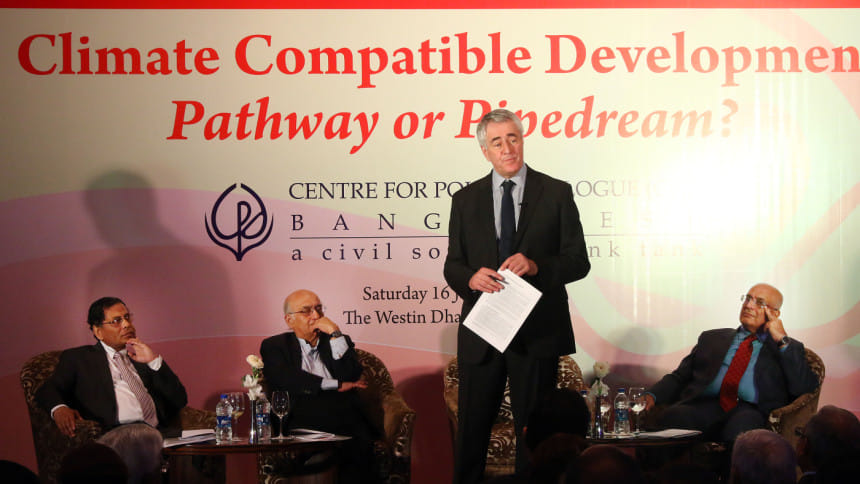In climate battle, bold leadership is the way forward

A leading climate expert yesterday called for bold leadership and well-defined policies to tackle the challenges of climate change.
It is worth remembering that leadership is measured by actions and not words, said Simon Maxwell, executive chair of UK-based Climate and Development Knowledge and Network.
Maxwell's comments came at a discussion styled 'Climate Compatible Development: Pathway or Pipedream', organised by the Centre for Policy Dialogue at the capital's Westin hotel as part of its anniversary lecture series.
Maxwell said Bangladesh should be lauded for its active role in the climate debates in Paris in December last year.
Bangladesh contributed immensely in putting the issue of vulnerability on the public stage alongside mitigation and helped to influence the spending priorities of the Green Climate Fund, he added.
Maxwell said there are many reasons to be anxious about the impact of climate change on development. “However, the poverty reduction and social inclusion goals of the sustainable development framework are non-negotiable. Climate compatible development offers a way forward.”
Climate-compatible development emphasises not only mitigation and adaptation within countries but also the impact on individual countries of transformation in the wider global economy.
In this context, innovation becomes a key concept, and competitiveness an essential tool, he said.
Climate compatible development explains how climate strategies integrate the threats and opportunities of a changing climate. As a result, it heralds a new generation of development processes that safeguard development from climate impacts and reduce or keep emissions low without compromising development goals.
Climate-compatible development goes one step further by asking policymakers to consider 'triple-win' strategies that result in low emissions, build resilience and promote development simultaneously, according to Climate and Development Knowledge and Network.
The adoption of the new sustainable development goals and the Paris agreement on climate change together poses a transformational challenge.
“This is so despite the fact that the concrete mitigation commitments made by countries in Paris amount to only about a quarter of those needed by 2030.”
In the longer-term, much more radical cuts will be needed, leading to complete elimination of carbon dioxide by 2070, and other greenhouse gases well before the end of the century.
Achieving the SDGs will require close integration of poverty, environmental and social action, well captured by the idea of zero poverty by 2030 and zero net emissions of carbon dioxide by about 2070.
He said there is no shortage of guidance on how to design a cap-and-trade regime, or an energy policy that favours renewables, or a package to strengthen resilience to climate shocks.
Quoting the Climate Action Tracker, Maxwell said it is clear that some countries like Bhutan, Costa Rica and Ethiopia have done their share while many others, including Australia, Canada and Japan, have not.
Future work on climate and development must be informed by the lessons of past development research and policymaking, and must build on the values held by those working in the field.
The energy expert hopes the private sector will participate even more enthusiastically in helping the country reach the targets on climate change and come up with new technologies to do so.
While talking about Bangladesh, he brought upon the issue of agriculture, which is a major source of livelihood in the country but also a major emitter of carbon dioxide to the world. “So, how does Bangladesh get to zero carbon agriculture by 2070?”
Presiding over the lecture, Rehman Sobhan, chairman of the CPD, talked about Prime Minister Sheikh Hasina's decision to start the construction of the Padma bridge with own funds after development partners withdrew promised assistance.
“The political challenge was met by the prime minister. They [the government] have now committed Tk 28,000 crore to construct this from our own resources.”
He however wondered if Bangladesh would be able to marshal such amounts of funds if it does not receive development assistance to overcome climate change impacts.
The sliding oil price, which is now at a 12-year low, is emerging as a serious setback for the climate change process, the economist said. “There was a shift towards fuel-efficient smaller cars when the oil price was $100 a barrel. But now many more SUVs are coming onto the markets. This issue has to be taken into account.”
He also touched upon local pollution, particularly that of the Buriganga river by the tanneries in Hazaribagh over the last three decades. The situation begs the question of why there were no effluent treatment plants in Hazaribagh in the first place, Rehman added.
CPD Distinguished Fellow Debapriya Bhattacharya said tackling climate change will require innovations in financing.
CPD Executive Director Mustafizur Rahman also spoke, while BRAC Founder and Chairperson Sir Fazle Hasan Abed were present among other dignitaries, development activists, economists and experts.

 For all latest news, follow The Daily Star's Google News channel.
For all latest news, follow The Daily Star's Google News channel. 



Comments